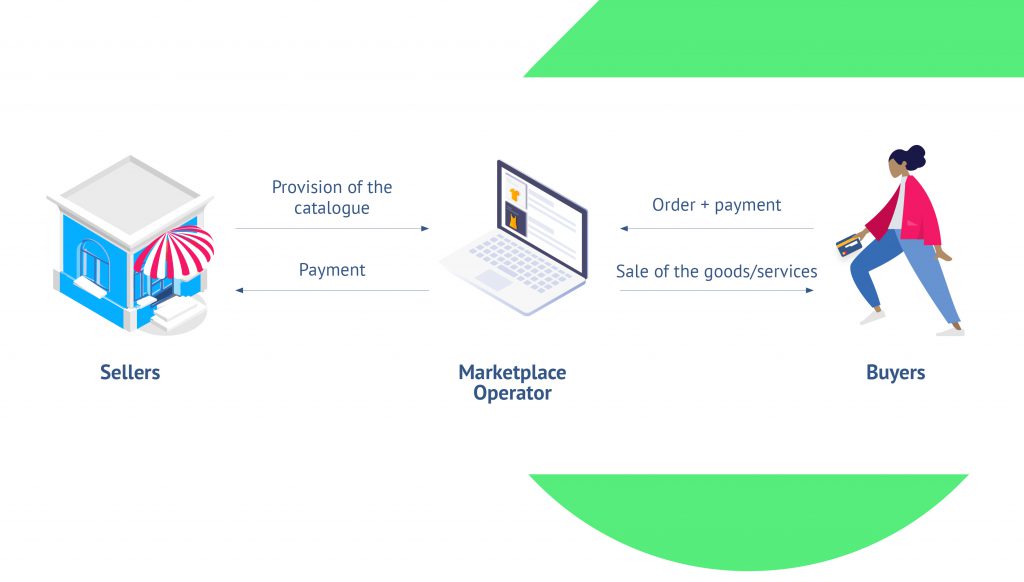

17 July 2020
As part of the digitalisation process of their businesses, many companies are considering creating their very own marketplace. Widely acclaimed, they allow operators to multiply their sales potential – thanks to the diversity of products and services that can be promoted – without having to face the limits usually encountered by traditional e-merchants. But what exactly is a marketplace?
Unlike a single-seller e-commerce website, a marketplace is an online platform that brings together several buyers and sellers. Merchants can sell either products or services. While the concept historically emerged in the C2C world with the platform Ebay, and then in the B2C world with Amazon, it is now offering new opportunities to B2B activities. According to Gartner, 75% of purchases will be made through a marketplace by 2022, while online B2B purchases have increased by 94% in the last 5 years.
According to a Retail Index study, “amongst the 10 most popular websites in Europe, 7 of them are marketplaces”. Why such a success? Incidentally, the marketplace model offers advantages to both consumers and sellers. Indeed, the marketplace offers buyers a large choice of products and services, while offering sellers access to thousands – if not millions – of potential buyers. Buying online has become a consumption reflex, and consumers have high expectations in terms of choice. Marketplaces are all the more popular as they are highly regulated, in order to make transactions safer.
A C2C marketplace is a platform dedicated to transactions between sellers and buyers, all of which being private individuals. In France, one of the most popular marketplaces is le Bon Coin, where private individuals sell all kinds of goods to one another. Let’s also mention Vinted, which allows to resell clothes, or even Blablacar, which allows to book carpooling trips with other individuals.
A B2C marketplace is a platform dedicated to transactions between professional sellers and individual buyers. Deliveroo for example, brings together local restaurants and food-delivery consumers. Or also ManoMano, where many furniture sellers address different buyers.
Whether it offers products or services, a B2B marketplace is a platform dedicated to transactions between professional sellers and buyers.
An example of that is Comet: a platform that connects companies and freelancers that offer their services. This B2B services marketplace made the recruitment process much easier, while offering independent workers a wide variety of job options, in full autonomy.
As far as B2B products marketplaces are concerned, one could mention Metro, whose role is to connect Asian wholesalers which offer many consumer goods, with companies around the globe.
E-commerce, commercial networks, franchise networks, e-procurement, circular economy…The marketplace can take different forms in the B2B world.
In the case of a commercial or associative network, or of a franchise network, the marketplace allows the network head to gather all its existing offers and services on a unique platform, managed by different network members. The Fédération Française de Football (French Football Federation – FFF), for example, uses it to facilitate the payment and invoicing of its licensee fees.
E-procurement refers to an internal purchasing platform, on which a company’s buyers will order products or services from referenced suppliers. For example, Engie has launched BeeWe, a B2B marketplace on which professionals from the energy sector can buy or sell spare parts.
Finally, B2B circular economy marketplaces give the possibility to recycle used products and to resell or rent second-hand products. The marketplace Kintessia therefore allows construction, agricultural, transport and handling companies, which own under-used equipment, to rent or sell it to other professionals.
As a regulated commercial intermediation service, the marketplace involves five main types of agents:

The marketplace is responsible for the food relationship between buyers and sellers. The safety of transactions is also part of its responsibility. The management of payments is therefore central to the success of a marketplace. To be compliant with both national and European regulations, the simplest thing to do is to outsource all payment services to a payment service provider, which is licensed by the ACPR, the Prudential Supervision and Resolution Authority.
Also read > Marketplace : 5 reasons why you should use a payment service provider
DSP2, LCB-FT, KYC and KYB, GDPR…You have to keep in mind that providing payment services, within the framework of a marketplace, is a highly regulated activity.
Dedicated to marketplaces, Lemon Way is a payment solution that handles all online payment related operations, while strictly meeting all regulatory requirements. Freed from this tedious and heavy task, you can focus on the development of your activity, with the peace of mind brought by a full compliancy with regulations.